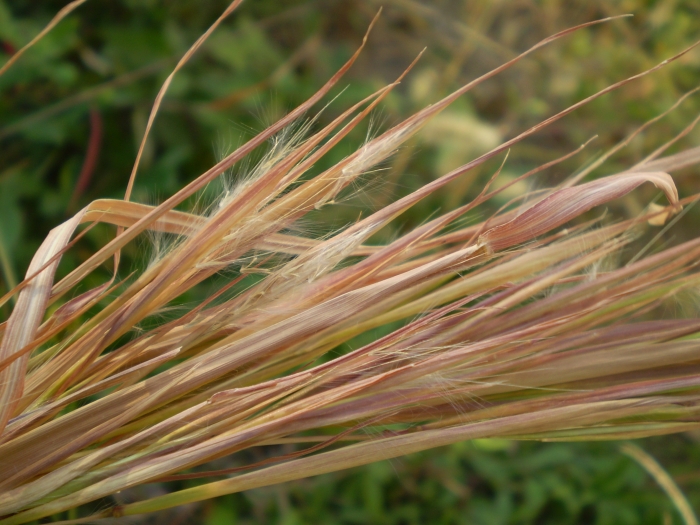Broomsedge Bluestem
(Andropogon virginicus)
Broomsedge Bluestem (Andropogon virginicus)
/
/

Show_ryu
CC BY-SA 3.0
Image By:
Show_ryu
Recorded By:
Copyright:
CC BY-SA 3.0
Copyright Notice:
Photo by: Show_ryu | License Type: CC BY-SA 3.0 | License URL: https://creativecommons.org/licenses/by-sa/3.0 | Uploader: Show ryu | Publisher: Wikimedia Commons | Title: Andropogon_virginicus_ears.JPG | Notes: User created page with UploadWizard |






































































Estimated Native Range
Summary
Andropogon virginicus, commonly known as Broomsedge Bluestem, is a deciduous perennial grass native to open woodlands, fields, and grasslands in the Eastern USA, extending into Central America and the Caribbean. It typically grows to a height of 2-4 feet (0.6-1.2 meters) and a width of 1-2 feet (0.3-0.6 meters). This species thrives in disturbed areas and is often one of the first species to colonize poor or degraded soils, which it can help stabilize.
Broomsedge Bluestem is noted for its changing color palette: green in spring and summer, transitioning to purplish-orange, and finally to a straw color in fall and winter, providing visual interest throughout the seasons. It is often used for naturalistic plantings, erosion control, and restoration projects due to its adaptability and ease of maintenance. It prefers full sun but can tolerate partial shade, and it is drought-tolerant once established, making it suitable for xeriscaping. While it can grow in a variety of soil types, it does best in well-drained soils. However, due to its prolific seeding and adaptability, Andropogon virginicus can become invasive outside its native range, particularly in Australasia and Hawaii, and should be planted with caution in these areas.CC BY-SA 4.0
Broomsedge Bluestem is noted for its changing color palette: green in spring and summer, transitioning to purplish-orange, and finally to a straw color in fall and winter, providing visual interest throughout the seasons. It is often used for naturalistic plantings, erosion control, and restoration projects due to its adaptability and ease of maintenance. It prefers full sun but can tolerate partial shade, and it is drought-tolerant once established, making it suitable for xeriscaping. While it can grow in a variety of soil types, it does best in well-drained soils. However, due to its prolific seeding and adaptability, Andropogon virginicus can become invasive outside its native range, particularly in Australasia and Hawaii, and should be planted with caution in these areas.CC BY-SA 4.0
Plant Description
- Plant Type: Grass
- Height: 2-4 feet
- Width: 1-2 feet
- Growth Rate: Moderate
- Flower Color: N/A
- Flowering Season: Summer, Fall
- Leaf Retention: Deciduous
Growth Requirements
- Sun: Full Sun
- Water: Low, Medium
- Drainage: Fast
Common Uses
Bird Garden, Border Plant, Butterfly Garden, Deer Resistant, Drought Tolerant, Erosion Control, Fire Resistant, Low Maintenance, Rabbit Resistant, Salt Tolerant
Natural Habitat
Open woodlands, fields, and grasslands
Other Names
Common Names: Yellow Bluestem, Barbon De Virginie, Broomsedge, Whiskey Grass, Yellowsedge Bluestem
Scientific Names: , Andropogon virginicus, Andropogon virginicus var. decipiens, Andropogon capillipes, Andropogon virginicus var. glaucus, Andropogon dealbatus, Andropogon dissitiflorus, Andropogon virginicus var. tetrastachyus, Andropogon glaucescens, Andropogon glaucus
GBIF Accepted Name: Andropogon virginicus L.